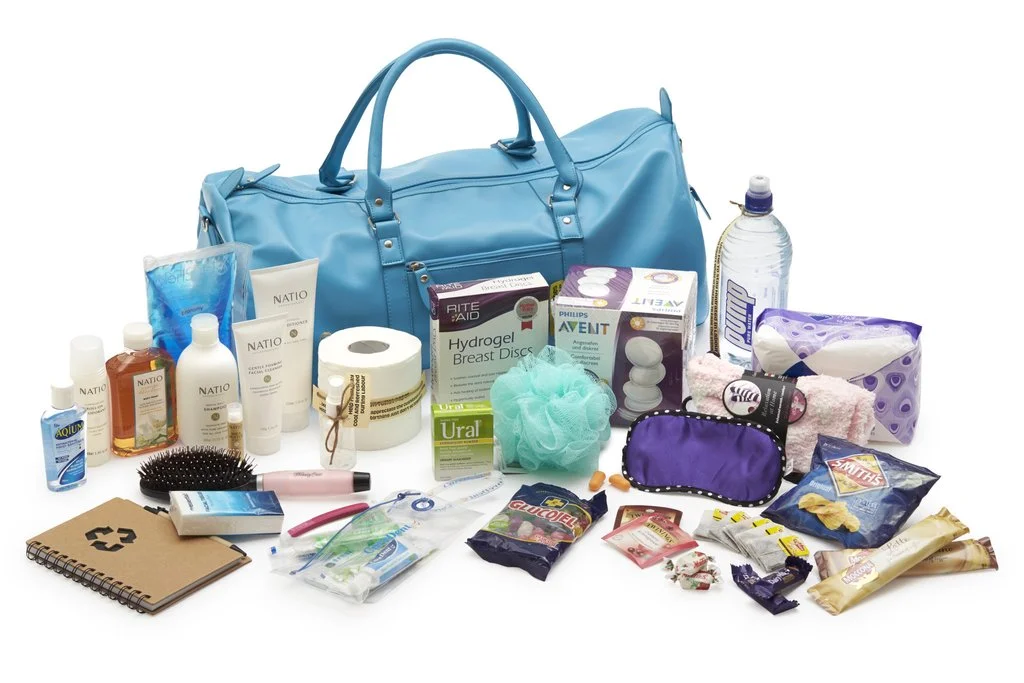There are a million thoughts that race through the minds of new parents when thinking about their soon-to-be baby including but not limited to registering, assembling the nursery, planning a baby shower, etc... Truthfully, there is only so much you can do to prepare for the baby’s arrival, but no matter how prepared you think you are, you are guaranteed to run into a few surprises. It’s akin to that episode of “I Love Lucy,” where Ricky, Ethel, and Fred practiced over and over again their roles for when “the time had come.” No matter how many times they practiced, when the time “finally came,” they were running around like chickens with no heads. Nevertheless, it helps to prepare and be as ready as possible. A great starting point is packing your hospital bag. I suggest that expectant families have their hospital bag packed at least three weeks in advance, just in case the baby decides to make an early debut. You can find plenty of packing lists on the internet - some helpful and some not as much. Are you the “bare minimum” type of planner or “be ready for all things” type of planner? After my own postpartum hospital stay, I compiled a packing list of my own that was the perfect happy medium for me. I had everything I needed for a normal 1-4 day hospital stay. Additionally, I tried to keep in mind that most postpartum rooms have limited space and limited storage. If you’re about to have a baby and want to have a great packed bag, this list is a good place to start.
For You:
-Birth plan. I always print two copies: one to post in the labor room and the other to give your hospital staff (doula, midwife, doctor, and nurses.)
-Comfortable pajamas. Although we all want to be cute in our Victoria Secret matching PJs, this is not conducive right after having a baby. I suggest a long nightgown that isn’t too constricting on the stomach, not pants that rub between the inner thighs or higher. For nursing mothers, I suggest an easy-to-open front top for nursing.
-Robe. This makes getting out of the shower easier and also allows you to cover up quickly should someone decide to pop in.
-Shower essentials. Shampoo, conditioner, body wash (remember the hospital only supplies small bottles) toothpaste, toothbrush, face wash, lip balm, headband, and lotion.
-House shoes. Comfy, no-slip house shoes are perfect so your feet never have to touch the cold floor. (Non-slip socks can go in place if you aren’t a house shoe type of person.)
-Comfortable underwear. Most hospitals will supply you with mesh underwear during your postpartum stay, but some new mothers find these uncomfortable. I suggest whipping out your cotton, oversized, granny panties that you don’t mind getting ruined. Most mothers are unaware that postpartum bleeding is very heavy.
-Nursing bra. For nursing mothers I suggest 2-3 extra nursing bras. Breastfeeding is sometimes messy, but if you are planning on a water birth or do not want to wear a gown, nursing bras provide great coverage if you aren’t comfortable bearing all.
-Nursing pads.
-Breast pump. The hospital normally provides a hospital grade pump; however, sometimes they may not be available.
-Comfortable going-home outfit. Loose pants and top are best. Tight clothing around your stomach can be uncomfortable.
-Charger. For your phone and any other devices
-Relax. Whatever other items that will make you feel at home such as essential oils, diffusers (as hospitals sometimes smell), pillow, eye mask, etc.
-Healthy snacks. Although hospital food has improved over the years, snacks are still good to have on hand for dad and for mom. Gatorade or water with electrolytes is also helpful for dehydration.
-Check-in information. Photo ID, insurance card(s), credit card(s), cash (vending machines), hospital paperwork, and a journal/baby book to log first days’ information.
For Baby:
-Infant car seat. Most hospitals will do a car seat test with your baby. This lets them know that your baby is able to ride in a car seat safely without having any health risks. Without a car seat you will not be able to leave the hospital.
-Bring-home outfit. It helps to pack several outfits 0-3 months as no one really knows the size or length the baby is going to be. Babies have difficulty regulating their body temperature for the first two weeks, so I encourage a warmer outfit.
-Receiving blankets or swaddle. Most hospitals supply during your stay, but request that everything be left so they can clean and recycle.
-Pacifiers.
If you would like to add a doula to your list of things to bring with you, call me. https://www.womanofvalordoula.com/new-page-1/
I hope you find all of these suggestions helpful.
Xo,
Ashley

